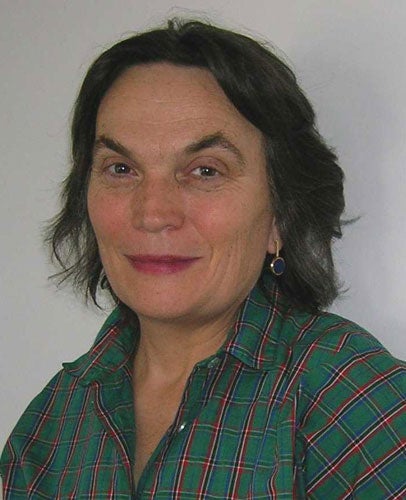Dorothy Porter: Poet who won international acclaimfor her verse novel 'The Monkey's Mask'

Your support helps us to tell the story
From reproductive rights to climate change to Big Tech, The Independent is on the ground when the story is developing. Whether it's investigating the financials of Elon Musk's pro-Trump PAC or producing our latest documentary, 'The A Word', which shines a light on the American women fighting for reproductive rights, we know how important it is to parse out the facts from the messaging.
At such a critical moment in US history, we need reporters on the ground. Your donation allows us to keep sending journalists to speak to both sides of the story.
The Independent is trusted by Americans across the entire political spectrum. And unlike many other quality news outlets, we choose not to lock Americans out of our reporting and analysis with paywalls. We believe quality journalism should be available to everyone, paid for by those who can afford it.
Your support makes all the difference.I never knew poetry / could be / as sticky as sex," observes the narrator of The Monkey's Mask (1994), a smooth-flowing, book-length, noirish verse thriller which brought an international audience for Dorothy Porter, who once asserted that: "writing should be seductive. The reader becomes my lover, in a way". Her death at 54 does not end the affair: anybody beguiled by that idiosyncratic volume, which also became a film starring Abbie Cornich and Kelly McGillis, will seek out the others.
Born in 1954 in Australia, she was brought up in Sydney and the Blue Mountains by her parents, Jean and Chester, a chemistry teacher anda criminal lawyer. Soon a keen reader who wrote in margins, heraldingher short lines, she was a classic tomboy, as she admitted in an exuberant interview with Jenny Digby in the book A Woman's Voice, a series of conversations with Australian poets (1996): "I was an odd child and have become an odd adult and I have found that it is the engine of my writing... as an adolescent you like being treated horribly; it is Gothic".
Although "perving" over one schoolteacher's husband, to use the Australian vernacular, she became bisexual and enjoyed various lovers after graduating from Sydney University in 1975 and combining teaching with wide travel. That year also brought a first collection, Little Hoodlum. Her rock'n'roll and gossipy sensibility is a compound of William Carlos Williams and the haiku, with dashes of Bob Dylan: "my catapault / is a sleek / little killer / fitting / snugly / in my smile / as / I pass you / a cocktail".
Subsequent volumes vindicated her comment: "I am a fairly feral feminist. I hate being trapped or restricted by any ideological things at all." She none the less felt that women's nervous systems differ from men's. She often wrote very well, she thought, "just before my menstrual cycle starts and on the first day when I'm feeling terrible". Joyfully forthright, she asserted that "a lot of Australian poetry has been extremely dull and boring and that is one of reasons why it has been unpopular and unread".
A turning point, between two sassy prose novels for teenagers, was Akhenaten (1992). In Berlin she had looked at the famous bust of the ancient Egyptian king's wife Nefertiti; he "put out tentacles to my imagination". She made Akhenaten appear contemporary, Bowiesque, and unleashed scenes of which "the spiked drink / of an erect nipple" is a mere taste.
While teaching in Long Bay Jail, she heard an inmate remark that a haiku thriller would be interesting, and she pinched the notion for The Monkey's Mask, in which the lesbian investigator Jill Fitzpatrick discovers considerably more when trying to trace a missing student. Some pages contain only a single haiku, others rather more, and all crackle along.
The sleeker plots of What a Piece of Work (1999) and Wild Surmise (2002) work to even better effect. In the first, a Sixties psychiatrist proves as troubled as his asylum's patients, finally leaving for private practice – with a kitten who "smells of promise / and sheathed claws / like most pre-conquest women".
In the other, a glamorous astro-nomer is as enthralled by a Jupiter moon as she is by a femalecolleague – which her scholarly husband discovers before cancer's onset ("a razor / from within"). It is a brilliant portrait of uneasy domesticity.
Death and astronomy had also haunted the collection Other Worlds (2001), and Porter turned to several libretti before herself being diagnosed with cancer in 2004. In shaking off what she called poetry's "modernist fatigue", she succeeded in making it "festive, fun, and dangerous", never "daggy": as she explained for English readers in the notes to the English edition of Monkey's Mask, that is "the antithesis of groovy. One of the most common Australian insults. The noun dag originally meant a knotted lump of wool and excrement hanging off a sheep's behind". She is survived by her partner, Andrea Goldsmith.
Christopher Hawtree
Dorothy Porter, poet: born Sydney 26 March 1954; died Melbourne December 10 2008.
Join our commenting forum
Join thought-provoking conversations, follow other Independent readers and see their replies
Comments